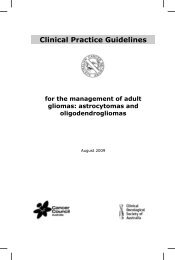Clinical Practice Guidelines for the management of locally advanced ...
Clinical Practice Guidelines for the management of locally advanced ...
Clinical Practice Guidelines for the management of locally advanced ...
You also want an ePaper? Increase the reach of your titles
YUMPU automatically turns print PDFs into web optimized ePapers that Google loves.
An Australian cross-sectional study <strong>of</strong> 195 men diagnosed with prostate cancer between 7 and 71<br />
months previously reported that 12% <strong>of</strong> <strong>the</strong> sample had clinically significant levels <strong>of</strong> anxiety, and<br />
16% had similar levels <strong>of</strong> depression. 41 None <strong>of</strong> <strong>the</strong> subjects in this study had <strong>advanced</strong> disease. A<br />
cross-sectional study <strong>of</strong> 716 men with prostate cancer aged 50-93 years evaluated depression using<br />
<strong>the</strong> Hospital Anxiety and Depression Scale. This study found that aging was related to less distress<br />
and less anxiety, but greater depressive symptoms. 42<br />
Research in patients with <strong>advanced</strong> prostate cancer is similarly limited. A prospective study<br />
conducted in <strong>the</strong> US examined depression and fatigue in 53 men with recurrent or <strong>advanced</strong> prostate<br />
cancer who had been randomised to treatment with ei<strong>the</strong>r parenteral leuprolide or oral bicalutamide. 43<br />
Over a 12 month period rates <strong>of</strong> at least mild depression ranged from 10.4% to 16.3%, with no<br />
significant differences between <strong>the</strong> groups, and no significant change in depression over time, despite<br />
<strong>the</strong> fact that fatigue increased during this period.<br />
The following studies relate to mixed cancer populations with <strong>advanced</strong> disease. One study <strong>of</strong> 33<br />
males and 35 females with <strong>advanced</strong> cancer reported prevalence <strong>of</strong> anxiety and depression as 25%<br />
and 22% respectively. 44 Although structured measures <strong>of</strong> mood were used, <strong>the</strong> response rate was low,<br />
and only 13% <strong>of</strong> <strong>the</strong> subjects had prostate cancer. A cross-sectional study <strong>of</strong> 74 patients attending a<br />
palliative care day unit found that depression affected one in four patients. 45 Pain and low mood were<br />
noted to be closely related, although <strong>the</strong> direction <strong>of</strong> causality is not clear. The proportion <strong>of</strong> patients<br />
with prostate cancer in <strong>the</strong> sample was not stated, although <strong>the</strong> male/female ratio was equal and all<br />
patients had <strong>advanced</strong> disease.<br />
Detection and treatment <strong>of</strong> anxiety and depression is important <strong>for</strong> several reasons. Analysis <strong>of</strong> studies<br />
involving 16,922 patients with chronic medical illness demonstrated that patients with depression had<br />
significantly greater symptoms when severity <strong>of</strong> medical illness was controlled <strong>for</strong>. 46 Fur<strong>the</strong>rmore,<br />
depression has been reported to be associated with reduced adherence to recommended treatments<br />
amongst patients with medical illness. 47 The identification <strong>of</strong> depression is aided by attention to<br />
known risk factors <strong>for</strong> psychological morbidity. These include <strong>advanced</strong> stage <strong>of</strong> disease; presence <strong>of</strong><br />
pain or functional disability; side-effects <strong>of</strong> treatment; fatigue and poor prognosis. 19 Individual risk<br />
factors include a past history <strong>of</strong> depression, economic adversity, lack <strong>of</strong> social support and poor<br />
marital or family functioning. 19 Treatment <strong>of</strong> anxiety and depression is generally effective and ideally<br />
incorporates psycho<strong>the</strong>rapeutic interventions and <strong>of</strong>ten <strong>the</strong> use <strong>of</strong> medications. 19 However, an<br />
Australian randomised controlled trial <strong>of</strong> antidepressant medication in patients with <strong>advanced</strong> cancer<br />
demonstrated no survival advantage and no benefit <strong>for</strong> mood <strong>for</strong> patients who did not meet criteria <strong>for</strong><br />
major depressive disorder.<br />
Evidence summary Level Reference<br />
There is little high-quality evidence describing <strong>the</strong> prevalence <strong>of</strong><br />
anxiety and depression in patients with <strong>advanced</strong> prostate cancer.<br />
Recommendations:<br />
III-3 44, 45, 47<br />
Health pr<strong>of</strong>essionals should be aware <strong>of</strong> risk factors <strong>for</strong> <strong>the</strong> development <strong>of</strong> anxiety and<br />
depression and be prepared to treat appropriately.<br />
Grade B<br />
Evidence from research in mixed cancer populations is that anxiety and depression are important<br />
comorbidities experienced by patients with <strong>advanced</strong> cancer, and that effective treatments are<br />
available.<br />
11<br />
Psychosocial care



